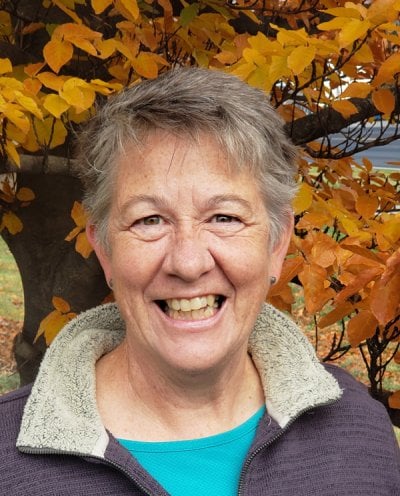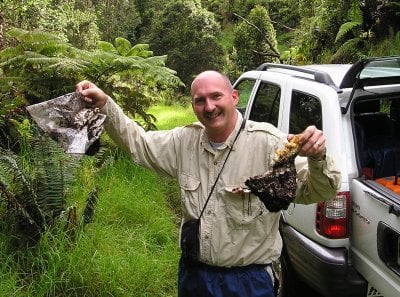In a world where voices seem to be getting louder all the time, there are still leaders who speak softly and lead with their actions. Deborah Page-Dumroese and Kasten Dumroese, two superstar scientists with the USDA's Forest Service, are that kind of leader—and when they choose to speak, their message echoes with the depth of their authority and expertise.
Known as Deb and Kas to the generations of researchers, planners, managers, and other professionals whose lives they have touched, these Michigan Tech alumni have built agency-leading, internationally known programs that will continue to define how the Forest Service does its work for years, if not decades, into the future.
Deborah Page-Dumroese
On her retirement from the Rocky Mountain Research Station in Moscow, Idaho, a part of the Research and Development Deputy Area of the Forest Service, Deb can look back on a career of leading soil science research programs that meld insight and discovery with real-world applications.

Deborah Page-Dumroese graduated from Michigan Tech in 1985 with her master's degree in forestry, and was inducted into the CFRES Honor Academy in 2022. With an H-index of 39 and literally hundreds of scientific publications, her research profile in forest soils is indisputable and known throughout the world. One might think that with such productivity, she spent her entire working career writing papers, but a look at her legacy with the Forest Service reveals far more.
Deb played a critical role in establishing the Long-Term Soil Productivity experiment, a more than 30-year-old network of experimental treatments examining the role of forest harvesting on soil properties and sustainable yields. She worked alongside other Michigan Tech notables like Research Professor Marty Jurgensen, her mentor and one of her longest-running research collaborators.
Deb also co-wrote the Forest Soil Disturbance Monitoring Protocol, which is the standardized system that Forest Service scientists use to track the effects of management activities across the nearly 200 national forests, grasslands, and other administrative units of the National Forest System. And in recent years, Deb has made it her personal mission to advance the state of the science on biochar, with a strong focus on increasing access to this soil-enriching, climate-change-fighting soil amendment at local scales all across the nation.
Deb is truly a giant in the Forest Service—and in the field of forest soil science overall. Her work has touched many careers. Much of it will be picked up and carried on by Derek Pierson, a talented early-career researcher who began working with the Forest Service on field projects when he was still a local high school kid in northern Idaho, where Deb forged her post-MTU career. This legacy is a testament to Deb's commitment to paving a path for future researchers to carry on with the work she's accomplished.
Kas Dumroese
In the world of reforestation and nursery management, Kas Dumroese is a name known as well and widely as Deb's is in soils. Kas has spent his multidecade career with the Forest Service based out of the same Moscow, Idaho, duty station, engaged in solving the problems that begin where roots meet soil.
Kas earned his BS in Forest Management from Tech in 1984. While some of his research has involved working with Deb, he has largely focused on his collaborative programs, which in recent years have included work as the Forest Service's national nursery specialist and director of the Western Center for Native Plant Conservation and Restoration Science.
Now more than ever, the reestablishment of trees after disturbances—especially after wildland fires in the West—is not a guarantee. Accelerating climate change, increases in the scale, severity, and frequency of fires, and the expansion of tree pests and pathogens have resulted in the critical need for a national strategy and infrastructure to support reforestation efforts all across the National Forest System, as well as lands under other jurisdictions. In recent years, Kas has been active at leadership levels on topics related to the reforestation crisis on Forest Service lands, including convening the 2017 Reforestation Summit in Portland, Oregon, which brought together a community of researchers, including David Flaspohler and Luke Nave of Michigan Tech's CFRES, to draw attention to the myriad ecological angles of reforestation. That event, and others that followed, have resulted in significant investments in nursery infrastructure nationally by the Forest Service. Owing to Kas's longstanding efforts to advocate for the planting of trees at all levels—from nursery management to national policy—the world will be a better, greener place in his retirement.
Deborah Page-Dumroese and Kasten Dumroese have made an international impact through their careers and the lives they have touched. Their dedication and accomplishments are more than a reason for CFRES to be proud—they're a point of pride for the entire University.
Article author Lucas Nave is a research associate professor in the College of Forest Resources and Environmental Science at Michigan Tech.
Michigan Technological University is an R1 public research university founded in 1885 in Houghton, and is home to nearly 7,500 students from more than 60 countries around the world. Consistently ranked among the best universities in the country for return on investment, Michigan's flagship technological university offers more than 185 undergraduate and graduate degree programs in science and technology, engineering, computing, forestry, business, health professions, humanities, mathematics, social sciences, and the arts. The rural campus is situated just miles from Lake Superior in Michigan's Upper Peninsula, offering year-round opportunities for outdoor adventure.





